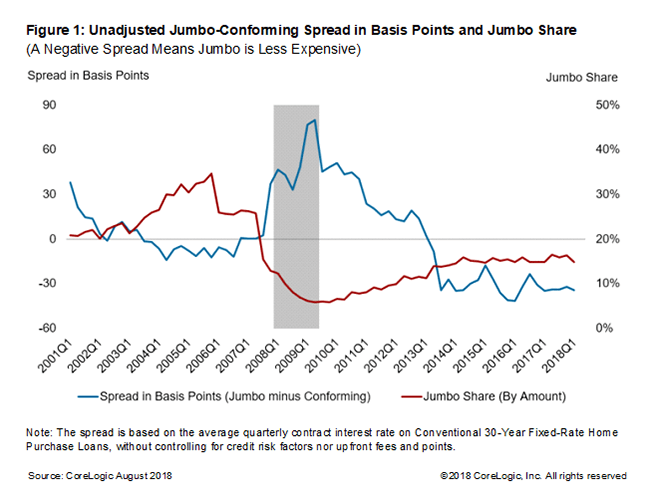Jumbo Loan: Exactly How to Receive Larger Home Financing
Jumbo Loan: Exactly How to Receive Larger Home Financing
Blog Article
Exploring the Perks and Qualities of Jumbo Loans for Your Next Home Acquisition Decision
As the property market advances, comprehending the details of big lendings comes to be progressively essential for prospective property buyers thinking about high-value properties. These financings not only promote considerable funding yet also use a number of advantages, such as competitive passion prices and the possible elimination of personal home mortgage insurance. Nevertheless, the path to safeguarding a jumbo finance is filled with specific eligibility criteria that might test some buyers. To totally appreciate how big fundings can affect your home purchase strategy, it is necessary to discover their vital attributes and benefits in greater detail.
What Is a Jumbo Funding?

Jumbo fundings are usually made use of by customers looking for to purchase high-value properties or homes in expensive markets. jumbo loan. Provided the bigger amounts obtained, loan providers usually impose stricter credit rating demands, consisting of higher credit ratings, reduced debt-to-income ratios, and larger deposits. The rate of interest on jumbo lendings may be slightly greater than those on adhering lendings, mirroring the raised risk for lenders
Additionally, the approval process for a big financing can be a lot more intricate and taxing, as lending institutions require comprehensive documents to examine the borrower's monetary security. Understanding these nuances is necessary for possible property owners thinking about a jumbo loan for their residential or commercial property funding needs.
Trick Advantages of Jumbo Loans
One significant advantage of big fundings is their ability to finance higher-priced properties that surpass adhering funding limits. This feature makes them an appealing alternative for buyers looking to buy luxury homes or properties in high-cost areas where rates commonly go beyond conventional finance thresholds.
Additionally, jumbo financings typically include flexible terms and affordable passion rates, enabling consumers to customize their financing to fit their unique financial situations. jumbo loan. This versatility can consist of choices for variable-rate mortgages (ARMs) or fixed-rate finances, supplying customers with the capability to handle their monthly settlements according to their preferences
Another advantage is that jumbo lendings do not need personal home loan insurance (PMI), which can dramatically minimize the general expense of the car loan. With PMI often being a significant expenditure for conventional fundings with low deposits, avoiding it can lead to substantial cost savings with time.
Moreover, debtors of jumbo car loans commonly have accessibility to higher finance quantities, allowing them to invest in properties that meet their way of living needs. This accessibility empowers buyers to act decisively in competitive realty markets, protecting their desired homes better. In general, jumbo finances offer Continue vital advantages for those seeking to finance costs homes.
Eligibility Demands for Jumbo Finances
Jumbo car loans feature details qualification requirements that potential debtors must fulfill to protect financing for high-value homes. Unlike traditional lendings, which have established limits based on the adjusting funding limits developed by government-sponsored entities, big fundings surpass these thresholds, requiring more stringent criteria.

Furthermore, jumbo financings often demand a significant down repayment, typically varying from 10% to 20% of the acquisition price, depending on the loan provider's policies and the debtor's financial scenario. Meeting these qualification requirements can position borrowers positively in protecting a jumbo financing for their desired building.
Comparing Jumbo Loans to Traditional Lendings
Recognizing the distinctions between traditional financings and big lendings is crucial for homebuyers browsing the high-end realty market. Big fundings go beyond the conforming financing limits established by the Federal Housing Money Company (FHFA), which indicates they are not eligible for purchase by Fannie Mae or Freddie Mac. This results in different underwriting criteria and requirements for customers.
In contrast, traditional loans normally follow these limits, enabling for a more streamlined approval process. Jumbo lendings often call for more stringent credit rating, bigger deposits, and greater monetary books. While a standard financing could need a down settlement of as little as 3% to 5%, jumbo car loans normally visit the website require a minimum of 10% to 20%.
Rate of interest on big lendings might differ from those Resources of conventional loans, commonly being somewhat greater due to the enhanced danger lending institutions presume - jumbo loan. The possibility for considerable funding can be helpful for buyers seeking deluxe residential properties. Inevitably, understanding these distinctions allows buyers to make educated choices, straightening their funding choices with their special buying needs and monetary conditions
Tips for Securing a Jumbo Loan
Safeguarding a jumbo lending requires mindful planning and prep work, as lending institutions often impose stricter needs contrasted to traditional finances. To enhance your opportunities of approval, start by examining your credit report and resolving any kind of issues. A rating of 700 or higher is typically chosen, as it demonstrates credit reliability.
Next, gather your economic documents, including tax returns, W-2s, and bank statements. Lenders usually need extensive evidence of income and possessions to evaluate your capacity to pay off the finance. Maintaining a low debt-to-income (DTI) ratio is likewise critical; goal for a DTI below 43% to enhance your application's competitiveness.
In addition, think about making a larger down repayment. Lots of lenders look for at the very least 20% down for big loans, which not only lowers your funding amount yet also signals financial stability. Engaging with a knowledgeable home loan broker can give invaluable understandings into the process and aid you browse numerous lender choices.

Conclusion
In recap, big lendings present substantial advantages for buyers looking for buildings that exceed conventional financing restrictions. Complete understanding of both the requirements and benefits associated with big loans is crucial for making informed home purchase decisions in a competitive real estate market.
The interest rates on jumbo car loans might be somewhat greater than those on adapting finances, mirroring the raised threat for loan providers.
While a standard car loan may call for a down settlement of as little as 3% to 5%, jumbo lendings usually demand a minimum of 10% to 20%.
Interest rates on big finances may differ from those of standard lendings, typically being slightly greater due to the increased danger loan providers assume.Safeguarding a big funding needs cautious planning and preparation, as lending institutions usually enforce more stringent requirements compared to traditional finances. Several lenders look for at the very least 20% down for big lendings, which not just minimizes your finance amount however additionally signals financial security.
Report this page